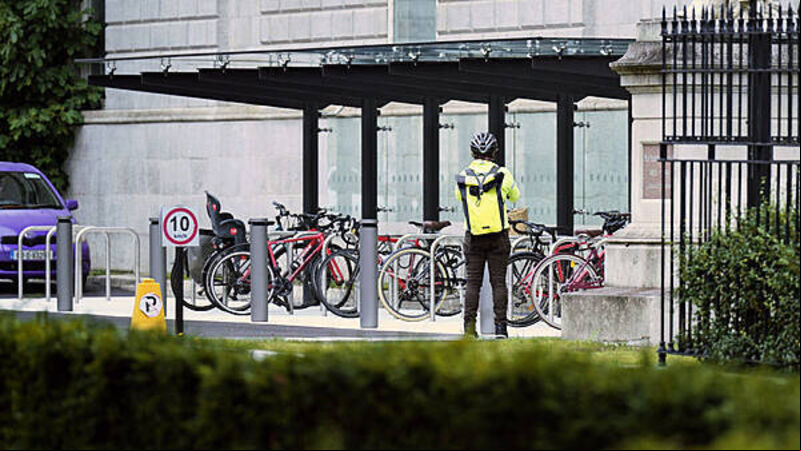Leinster House bike shed had no value for money assessment before work began, report finds

Ken Foxe
An internal audit on the €336,000 Leinster House bike shelter project found that no value for money assessment was ever conducted in advance of the works.
It said the costs of the OPW project had never been communicated to the Houses of the Oireachtas and that there was a lack of clear guidelines for oversight of projects worth less than €500,000.
The report, which was carried out by Deloitte, made three high priority findings and said there was an “absence of some fundamental good practices” for projects like the controversial bike shed.
It said a value for money assessment should have been conducted as part of a “robust options appraisal process.”
The internal audit said this would have included looking more closely at “lower cost alternatives” as well as the possibility of “doing nothing.”
It said: “Approval to proceed with the project should only have been formalised when these evaluations were complete.”
The audit also found there was no proper governance structure in place for projects that had a value of less than half a million euro.
It said: “The OPW cannot demonstrate how value for money was considered across all aspects of the decision to proceed with the delivery of the covered bike shelter project.”
The report found as well that management at Leinster House had not been given any information on how much the project would cost until it was completed.
The audit said: “The June 2021 decision to proceed with the Bike Shelter project was made without presentation or discussion of project costs.
“The HOC [Houses of the Oireachtas Commission] did not request cost information, and the OPW did not present cost information.”
The auditors said when this happened there was a higher risk of poor value for money and “an increased risk of mismatch in expectations on delivery versus cost of delivery.”
The OPW said these findings had been accepted and that costs for works at Leinster House were now being communicated on a regular basis.
The audit also found that while the Office of Public Works had a programme management plan in place, it was “not necessarily easy to navigate”, especially for smaller projects like the bicycle shelter.
It said: “Where there is a lack of oversight of projects, there is a risk that these projects may not represent value for money or may not deliver to exact requirements in an efficient and effective manner.”
There was a finding made as well that some of the paperwork for the project had not been signed or dated properly.
In its findings, the internal auditors said there should be “sample-based spot checks” made to ensure compliance.
The report found more generally that the OPW’s internal auditors were not always provided timely updates or information by colleagues.
It said: “Where the [head of internal audit] is not at an equivalent level to the senior management team, there is a risk of lack of engagement from management.
“[There is also] a risk that the ARC [Audit and Risk Committee] is not receiving the appropriate assurance as to the effectiveness of the control environment within the OPW.”
The report was released by the OPW following an appeal made under Freedom of Information laws.
In an information note, they said: “The internal audit report will provide a focus for continuing to strengthen ways of working across the OPW.
“This report will provide a platform from which control improvements can be made for capital projects into the future.
“The OPW has accepted and is actively implementing all of the recommendations within the report.”









